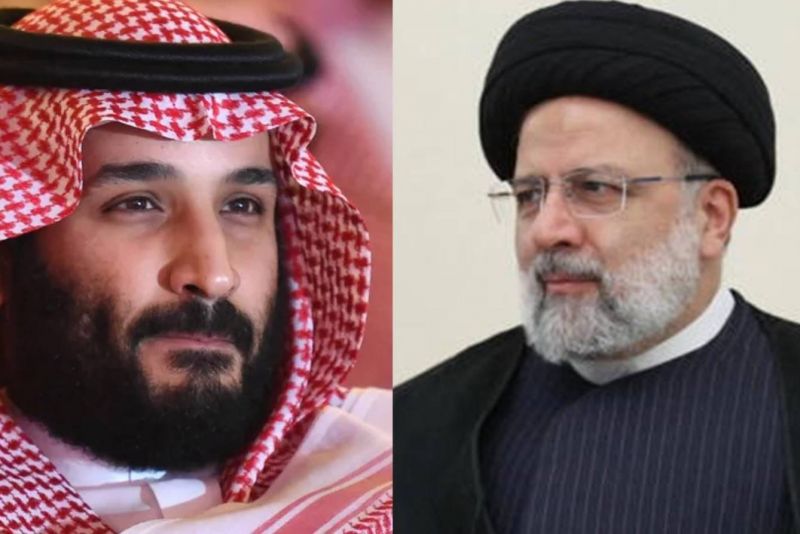
Saudi Crown Prince Mohammad bin Salman and Iranian President Ebrahim Raissi spoke over the phone on October 11. This is their first direct exchange since the Iranian-Saudi detente was signed on March 10 in Beijing. ( Credit: AFP photos/Photomontage Guilhem Dorandeu)
Saudi Crown Prince Mohammad bin Salman (MBS) and Iranian President Ebrahim Raissi addressed the ongoing military escalation in Gaza over a phone call on Wednesday evening, according to the Saudi Press Agency (SPA) and the Islamic Republic News Agency (INRA).
The call, as reported by INRA, was more than a customary exchange and lasted for 45 minutes. While the Iranian statement emphasized the need to halt “war crimes,” the Saudi statement relayed the Kingdom’s “unwavering commitment to the Palestinian cause and its support for endeavors aimed at achieving a comprehensive and equitable peace that secures the legitimate rights of the Palestinian people.”
The phone call marks the first public exchange between the two leaders since the signing of the Saudi Iranian detente agreement in Beijing on March 10, seven months ago.
The significance of this development is heightened by the fact that the reconciliation between Riyadh and Tehran has yet to yield tangible outcomes beyond the realm of diplomacy. In contrast, the process of normalization between Saudi Arabia and Israel has dominated media coverage in recent months, overshadowing the Beijing agreement. Just three weeks ago, MBS declared on Fox News that negotiations with Israel were advancing “a little more every day.”
For the time being, it appears those negotiations have taken a back seat.
Dissaproval
For Riyadh, this move also underscores its commitment to the Palestinian issue, a matter it has consistently raised in discussions with Israel. These discussions have been hampered by Saudi insistence on ending settlement activity in the West Bank and establishing a Palestinian state.
This stance is one that Saudi Arabia has been eager to emphasize in light of the unprecedented Hamas attack and the subsequent fighting, which has resulted in around 1,000 Israeli casualties since Oct. 7.
“The Israelis were very quick to hope that [the Saudi stance] would remain verbal and that they could achieve normalization that would not take the Palestinians into account,” said Joseph Bahout, director of the Issam Fares Institute at the American University of Beirut (AUB). “This has been an essential part of [Prime Minister Benjamin] Netanyahu’s regional strategy.”
“And now there's a real setback,” he added. “The Saudi phone call and stance since the start of the conflict indicate that, at heart, that these normalization agreements, primarily conceived by Israel to address Iran while disregarding the Palestinian issue, are inherently fragile agreements.”
In a statement issued Saturday, the day of the attack, the Saudi Foreign Ministry carefully avoided condemning the Hamas offensive, while blaming it squarely on the “Israeli occupation forces.”
The Saudi Ministry said it had repeatedly warned against the “occupation, the deprivation of the Palestinian people of their legitimate rights, and the repetition of systematic provocations toward the holy site,” which led to this moment.
“The call between MBS and Raissi represents a continuation of the Saudi initial position, which came as a shock to Israel,” said Bahout. “It’s a political position that goes beyond the humanitarian issue behind which the UAE or other [Arab] countries are hiding.”
Criticism from Arab populations
Saudi Arabia also faces another significant concern: It must prevent Iran from exclusively controlling the Palestinian cause, especially after Arab countries have criticized it for normalizing relations with Israel.
“Iran is winning a lot of reluctant praise even from those who dislike its policies in the region,” said Sami Hamdi, founder of geopolitical consultancy The International Interest. “And there is a growing respect for how Iran appears to be empowering its allies at a time the Arab states are abandoning them.”
“MBS’ call to Iran is not about securing Palestinian rights or defending them,” Hamdi said. “It's about keeping options open as the conflict unfolds that will allow MBS to keep ties with Israel if the outcome is favorable to them and claim support for resistance if the outcome is favorable for Palestine.”
For Bahout, “Saudi Arabia will continue to do everything in its power to keep calm in between the Gulf and Iran, and to maintain contact with Israel behind the scenes, including on the Palestinian cause, even if this angers the Israelis.”
“However, if Iran resumes a strong offensive position in the region, this will lead to more rapprochement [between Israel and Saudi Arabia,” he added. “There will always be an interest in keeping a thread between the kingdom and Israel.
This article was originally published in French in L'Orient-Le Jour. Translation by Sahar Ghoussoub.